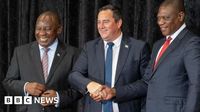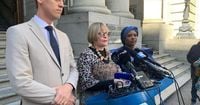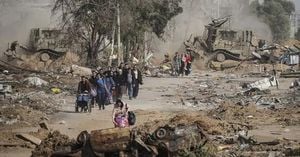South Africa's coalition government is facing significant turmoil as divisions between the African National Congress (ANC) and the Democratic Alliance (DA) have come to a head over proposed tax increases. This discord was most recently highlighted during a crucial vote on the national budget, where the DA's rejection of a Value Added Tax (VAT) hike has prompted serious discussions about the future of the government of national unity (GNU).
ActionSA's Chief Whip, Athol Trollip, has indicated that his party will reconsider its participation in the GNU if the DA decides to exit the coalition. In a media briefing, Trollip warned the ANC of consequences if they do not reverse the planned VAT hike set to take effect on May 1, 2025. "If we don’t find a solution in the next 27 days, do not look to us to support you (ANC) to pass the rest of the budget," he stated, emphasizing the urgency of the situation.
The tension escalated after the ANC successfully passed the fiscal framework, which includes the VAT increase, with support from smaller parties. The vote concluded with a margin of 194 to 182 in favor of the fiscal framework, despite the DA's vehement opposition. The DA has since filed papers in court to challenge the vote, claiming it was "procedurally flawed" and has called for a meeting of its top leadership to discuss its continued participation in the GNU.
Professor William Gumede from Wits University noted that the DA is at a crossroads, weighing whether to remain in the coalition or to exit following this latest dispute. "It will be asking itself whether this is the tipping-point or whether it should wait - at least until the outcome of the court case," he said.
The coalition government was formed less than a year ago after the ANC lost its parliamentary majority for the first time since the end of apartheid in 1994. The business sector had lobbied for this coalition, seeing it as a means to ensure economic stability. However, the current discord raises questions about its longevity.
DA spokesman Willie Aucamp has criticized the ANC for what he described as a "serious infraction," hinting that the party may be prepared to withdraw from the coalition. Helen Zille, the DA's federal chair, echoed this sentiment, stating that the party would consider all options, indicating that they are not rushing into a decision. "We know that being in a coalition requires compromise. You can't get it all. But the ANC also can't get it all, and they are refusing, point blank, to share power," Zille added.
On the other hand, the ANC has accused the DA of betrayal. Parliamentary Chief Whip Mdumiseni Ntuli stated, "The DA is a member, or was a member. I don't know what is going to happen with them now, but the GNU remains," underscoring the ANC's commitment to the coalition despite the DA's wavering support.
President Cyril Ramaphosa's spokesman has also weighed in, suggesting that the DA's continued participation is contingent on their willingness to support the government's budget initiatives. "You can't be part of a government whose budget you opposed," he remarked, indicating the growing rift within the coalition.
Adding to the political uncertainty is the recent decision by the Trump administration to impose a 30% tariff on all South African imports, a move that has further complicated the economic landscape and intensified calls for unity among the coalition parties. The ANC argues that the VAT increase is necessary for raising revenue to support essential public services such as health and education.
As tensions mount, the rand has taken a hit, weakening by 2.3% on the day of the budget vote, marking its most significant single-day drop since August 2023. Political analysts have expressed concern over the implications of this instability on South Africa's fiscal stability. Jervin Naidoo from Oxford Economics stated, "The unprecedented budget impasse has shaken confidence in South Africa’s fiscal stability and put the GNU coalition on thin ice."
In the midst of this turmoil, ActionSA has positioned itself as a key player. The party, which broke away from the DA, has reached an agreement with the ANC to scrap the VAT increase while exploring alternative revenue-raising methods. This development has raised eyebrows, as it suggests a strategic pivot that could influence the balance of power within the coalition.
As the DA grapples with its next steps, it faces pressure from its financial backers to remain in government, balancing the need to influence key policies against the risk of appearing inconsistent after voting against the budget. Amaka Anku, an Africa analyst at Eurasia Group, noted the DA's dilemma: "If the party remains in government, it will look silly after voting against the budget. Yet DA financial backers want the party to stay in government and influence the implementation of key policies such as the Expropriation Act."
The outcome of this political standoff remains uncertain, as the coalition's future hangs in the balance. With the ANC needing to maintain its parliamentary majority, the stakes are high for all parties involved. Should the DA decide to exit, it would force the ANC to seek support from other parties, potentially leading to a more fragmented political landscape.
As South Africa watches these developments unfold, the question remains: can the coalition government navigate its way through this crisis, or will it succumb to the pressures of internal discord? The coming weeks will be crucial in determining the path forward for the GNU and the future of governance in South Africa.






